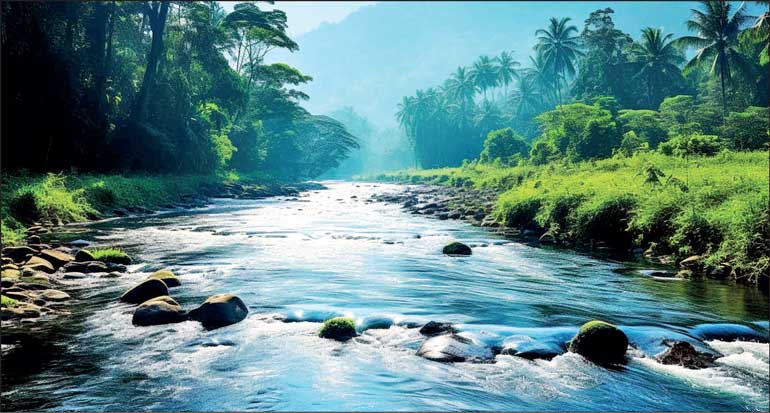Tuesday Mar 03, 2026
Tuesday Mar 03, 2026
Saturday, 9 September 2023 00:05 - - {{hitsCtrl.values.hits}}

Nature-based solutions protect, amplify, and/or utilise existing ecosystem services and benefits
for various purposes
 “Nature-based solutions” (NBS) has become a common term in discussions around climate change, environmental conservation, and sustainable development. But what exactly is a nature-based solution, and under which circumstances can it unfold its full potential? How can countries such as Sri Lanka employ nature-based solutions as cost-effective interventions, and what are some of their potential use cases?
“Nature-based solutions” (NBS) has become a common term in discussions around climate change, environmental conservation, and sustainable development. But what exactly is a nature-based solution, and under which circumstances can it unfold its full potential? How can countries such as Sri Lanka employ nature-based solutions as cost-effective interventions, and what are some of their potential use cases?
The resumed 5th United Nations Environment Assembly (UNEA 5.2) in February-March 2022 provided a global definition for NBS: “Actions to protect, conserve, restore, sustainably use, and manage natural or modified terrestrial, freshwater, coastal, and marine ecosystems which address social, economic and environmental challenges effectively and adaptively, while simultaneously providing human well-being, ecosystem services, resilience, and biodiversity benefits.”
Similarly, the European Commission defines NBS as “solutions that are inspired and supported by nature, which are cost-effective, simultaneously provide environmental, social, and economic benefits, and help build resilience,” while the earlier IUCN definition focused on “leveraging nature and the power of healthy ecosystems to protect people, optimise infrastructure, and safeguard a stable and biodiverse future.”
Across all definitions, NBS are focused on addressing challenges—mostly environmental, social, economic, or climate-related—by harnessing the benefits of natural ecosystems and processes through protection, conservation, restoration, rehabilitation, assisted growth, and/or sustainable use, which often turns out to be more cost-efficient and effective than “traditional” engineering solutions, grey infrastructure, or nature-blind business practices and models.
A global reemergence of nature-based solutions
While NBS as a term emerged in the late 2000s, it has recently garnered renewed attention, especially in the wake of the 27th meeting of the Conference to the Parties to the United Nations Framework Convention on Climate Change (COP27) and the establishment of the Kunming-Montreal Global Biodiversity Framework (GBF) under the Convention on Biological Diversity in late 2022.
For example, the COP27 cover decision (the Sharm el-Sheikh Implementation Plan) encourages Parties “to consider, as appropriate, nature-based solutions or ecosystem-based approaches […] for their mitigation and adaptation action” while underlining the importance “of protecting, conserving, restoring, and sustainably using nature and ecosystems for effective and sustainable climate action.” COP27 also saw the launch of the ENACT initiative, which aims to enhance nature-based solutions for an accelerated climate transformation and strengthen collaboration between existing efforts from both state and non-state actors.
Under the Convention on Biological Diversity, the GBF directly refers to nature-based solutions in its targets 8, 10, and 12, and includes relevant elements and indicators in a variety of other targets as well. As part of the 23 targets under the GBF’s four overarching goals, NBS therefore become part of the framework’s overall mission to take urgent action to halt and reverse biodiversity loss by 2030 and substantially increasing the area of natural ecosystems by 2050.
Nature-based solutions for Sri Lanka
Many NBS function along the line of amplifying or utilising existing ecosystem services and benefits for various purposes. Some examples include climate change mitigation (carbon sequestration and storage through forests), regulation of heat and air quality (e.g., green roofs and walls), flood control and water treatment (e.g., urban wetlands and waterways), disaster risk reduction (e.g., mangrove belts to protect coastal settlements and infrastructure), livelihood generation (e.g., through ecotourism, climate-smart agriculture, and sustainable (agro)forestry), or public health (e.g., bats controlling dengue mosquito populations).
As a climate-vulnerable island nation, Sri Lanka faces both challenges and opportunities when it comes to the utilisation of NBS. On the one hand, the country needs to find cost-effective and affordable solutions to address climate impacts and strengthen economic development and growth. On the other hand, it has the potential to harness NBS for both a green and a blue economy, scaling up nature-based businesses to benefit from the island’s existing wealth of biodiversity and variety of productive natural ecosystems.
This entails fully nature-based solutions, such as restoring urban wetlands (Colombo’s wetlands, for example, have lost 40% of their water holding capacity over the last decade, but could play a critical role for disaster risk reduction and improvement of water and air quality) or afforestation to increase the national forest cover (in line with national commitments and goals), but also the integration of nature-based elements into business models and supply chains. For example, nature-based ingredients and methods could be used in sectors such as the fashion and garment industry; mangrove belts and other ecosystems could be integrated into the design of coastal hotels or resorts; seagrass and other aqua- and mariculture could enhance the blue economy; and investment could be channelled into agroforestry and sustainable, nature-positive agricultural practices, building on existing local and traditional knowledge.
NBS hold the potential to provide benefits for people, planet, and the economy, but they need to be supported by appropriate frameworks that facilitate investment, prevent greenwashing, and enable entrepreneurs, SMEs, and corporates to access relevant data, resources, accreditation, certification, and risk management techniques. Mainstreaming conservation and sustainable utilisation of natural resources could unlock key synergies and co-benefits across all relevant sectors of Sri Lanka.
(The writer works as Director: Research and Knowledge Management at SLYCAN Trust, a non-profit think tank based in Sri Lanka. His work focuses on climate change, adaptation, resilience, ecosystem conservation, just transition, human mobility, and a range of related issues. He holds a Master’s degree in Education from the University of Cologne, Germany and is a regular writer to several international and local media outlets.)